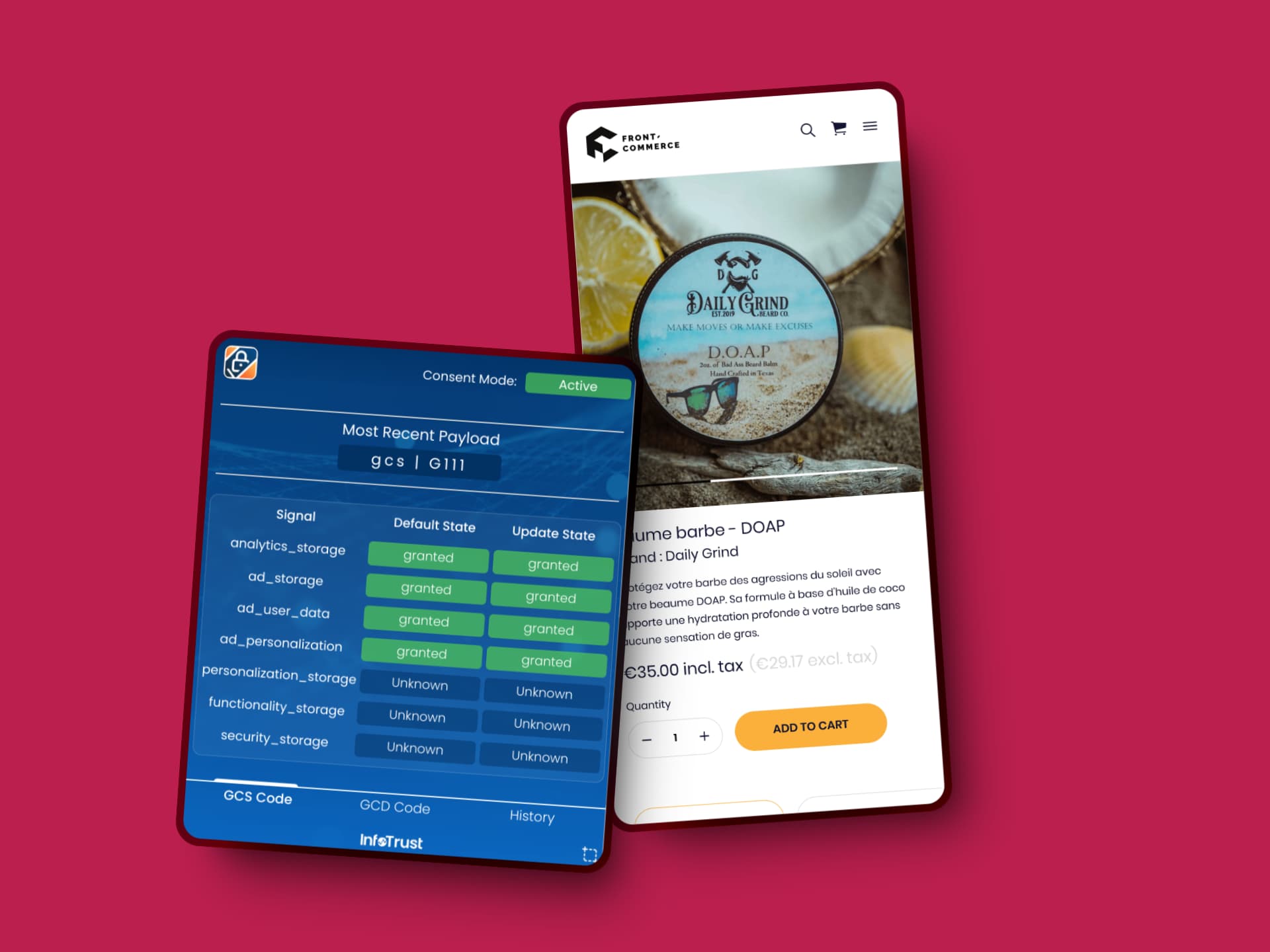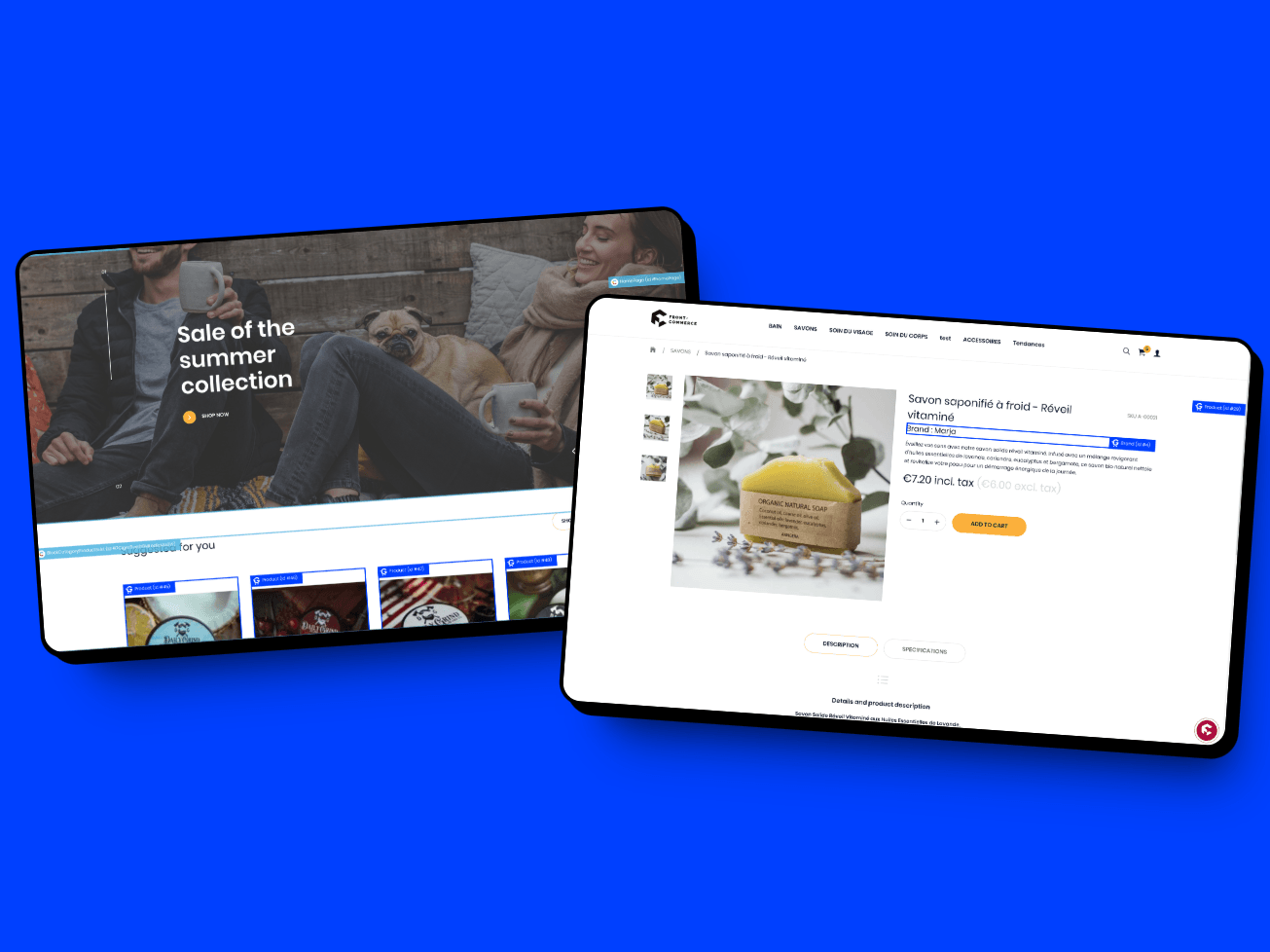Release: 3.9 & 2.34
Consent Mode V2, Consistent Price Display, Gezy advanced capabilities and Extension Features API
We know you're likely busy preparing for the Black Friday and the holiday
season, so are we! 🎄
For our final release of the year, we successfully introduced several new
features and enhancements in Front-Commerce versions 3.9 and 2.34.
Here's a quick overview of the key highlights in this release:
- Google Consent Mode V2: Enhanced analytics compliance with granular consent options.
- Consistent Price Display: New
<PriceVariant />component for uniform price presentation across the theme. - Gezy Enhancements: Advanced capabilities including facet filters, guest cart support, company accounts, advanced shipping and payment methods.
- X-Ray Mode for Gezy: Streamlined content management with the Magic Button for Gezy merchants.
- Extension Features API: New API for cleaner and more maintainable theme extensions.
Let's explore the full details!
Google Consent Mode V2 for analytics services
We've enhanced our analytics capabilities to support Consent Mode V2 (for European Economic Area compliance), in both Front-Commerce 2.x and 3.x versions. This update brings more granular control over user consent for analytics services, ensuring compliance with privacy regulations while maintaining effective data collection.
This change includes:
- Granular Consent Options: Users can now provide more specific consent for different aspects of data collection and usage.
- Google Analytics and GTM integrations: Our Google Analytics and GTM plugins now supports Consent Mode V2 out of the box.
- Flexible Consent Management: The new
withConsentadapter method enables dynamic updates to consent settings as user preferences change, for custom plugins.
Please refer to our Granular Consent Updates to learn more about implementing Consent Mode V2 in your Front-Commerce project. For existing projects, follow our Migration Guide to ensure your analytics stack is up-to-date (if you customized the analytics integration).
Display Prices consistently across your store
In this release, we introduced a new <PriceVariant /> component that support
an app-wide configuration to display prices consistently across your store.
With this improvement, the theme now relies on a single source of truth for price display configuration. Choose between displaying prices with or without taxes, or both, to suit your business needs and improve the shopping experience for your customers.
Some highlights of this new feature:
-
Consistent Experience: The new configuration ensures a uniform price display across different sections of your store, creating a cohesive and professional look. It should help reduce customer confusion and potentially improve conversion rates.
-
Exception for Cart Summary: To maintain clarity in financial calculations, the cart summary will continue to display a detailed breakdown, including subtotals, shipping costs, taxes, and the total amount.
-
Easy Configuration: Set up your preferred price display format through a simple configuration in your theme settings (or dynamically based on custom business logic).
It is fully backward compatible with the previous price display system, so you can safely upgrade your theme without any breaking changes. It can also coexist with the previous price components (it reuses them).
Learn more about this feature and how to configure it in our Display Prices with or without Taxes guide and the Price Display reference page.
Gezy: advanced capabilities for demanding merchants
Building on our previous releases, we kept improving our Gezy integration to support advanced capabilities. This release includes support for facet filters on Product Listing Pages (PLP) and Search results, allowing users to easily refine their searches and find products quickly.
We've also added guest cart support, enabling users to add items without logging in, which streamlines the purchasing process. Additionally, Company accounts allow businesses to register and access tailored functionalities. The addition of several account-related features (address management, password update, order history…) finalizes the account management experience for both individuals and companies.
The checkout process has been enhanced with sophisticated payment and shipping methods, meaning that most Payment and Shipping methods available in Gezy are now supported by Front-Commerce. Finally, we've implemented a Gezy Health Check to automate maintenance mode detection, preventing broken user experiences when the platform is undergoing maintenance or unexpected issue.
These updates reflect our ongoing commitment to providing a robust platform that meets the diverse needs of merchants and enhances user satisfaction.
X-Ray mode for Gezy
Another feature we've added to Gezy is full compatibility with Front-Commerce's X-Ray mechanism (Magic Button).
Store managers can now use the Magic Button to identify Gezy content and directly open the related Gezy admin page. This feature streamlines content management and improves daily operations!
Reach out to us to schedule a personalized demo of Gezy and Front-Commerce, and discover how our platform can support your specific business requirements.
Introducing the Extension Features API for theme extensions
We're proud to introduce a new Features API in Front-Commerce. It introduces cleaner extension points for common project needs. We hope it will improve maintainability of Front-Commerce applications when it comes to customizing the default theme.
The Features API introduces a new way to extend specific parts of the theme (menus, actions, additional data, etc.), replacing the previous reliance on conventions and overrides. This new API introduces:
- Component Maps: Implement extension points for common project needs by defining component maps for specific features in your theme.
- Feature Flags: Define and manage feature flags when registering features in extension definitions.
- Extension Hooks: New hooks for registering and extending feature component maps.
In this release, we've refactored several components in the core theme to leverage the new Features API. As of today, Front-Commerce supports customizable features for things like dynamic facets, newsletter management, account deletion or root error meta customization.
🤿 Diving into a quick technical example 🤿
Hi 👋
We hope you'll be using this feature as you work on your Front-Commerce
projects. So here's a code snippet to illustrate how you'll be able to use this
new API as of today. Let's register new components or override existing ones
using the registerFeature hook:
// extensions/acme-extension/index.ts
export default defineExtension({
unstable_lifecycleHooks: {
// this hook is called when Features are initialized, allowing you to interact with the Features API
onFeaturesInit: (hooks) => {
// Each feature will have its own unique identifier (e.g. "acme-feature") documented in the theme's extension guide
hooks.registerFeature("acme-feature", {
// This is how you can define the components that will be used in the theme
ui: {
componentsMap: {
Header: new URL("./components/AcmeHeader.tsx", import.meta.url),
Footer: new URL("./components/AcmeFooter.tsx", import.meta.url),
},
},
});
// Another example with a feature flag that can be toggled on/off
hooks.registerFeature("newsletter", {
flags: {
enabled: false,
},
});
},
},
});
This is just a quick overview of the new Features API. We hope you'll find it useful in your projects. If you have any questions or need help, don't hesitate to reach out to us!
These first use cases showcase the potential of the Features API. Expect more extensive usage in future versions as we continue to explore the possibilities!
Other changes
We additionally worked on changes and bug fixes across different areas of the product. You'll find a summary of these changes below.
Features
-
Theme:
- we improved the default display of shipping methods to avoid text overflowing outside of their container elements, and to avoid breaking words in a way that reduces readability.
- dynamic facets are now more generic and can be extended to support more
types of filters display. We added support for two new types of filters:
TextSearchFacetandRangeSearchFacet. Read more in the Facets feature documentation. - order details page now displays the image of ordered products
- registration form now supports company registration if the platform supports it
- it is now possible to toggle account registration for individuals and companies using configurations. The registration page will display a message and a button to contact the merchant if account registration is disabled
- user information screens now support phone number for platforms that require it
- the theme now relies on a platform agnostic
referencefield for product, cart items and orders to support platforms where a SKU is not relevelant - promotional prices are now displayed on each cart item line.
-
Service worker:
- we tackled a long-standing feature request from our customers to reduce
service-worker logs verbosity. We now allow to configure the disablement of
service-worker logs in
entry.worker.tsusing thedisableDevLogsanddisableStorefrontContentDevLogsoptions. We changed the default behavior and disabled Workbox dev logs but maintained Storefront Content ones.
- we tackled a long-standing feature request from our customers to reduce
service-worker logs verbosity. We now allow to configure the disablement of
service-worker logs in
-
Storybook
- public configuration are now available in Storybook based on the definition
in
front-commerce.config.ts - we added new stories for several components (related to price display configuration). Browse our demo's styleguide to see them in action.
- public configuration are now available in Storybook based on the definition
in
-
Config:
- we added a new
comma-separated-stringformat for custom configuration providers'convictschema
- we added a new
-
Remix:
- it is now possible to customize route error pages SEO meta tags with
intlmessages. Read more at Customizing meta tags.
- it is now possible to customize route error pages SEO meta tags with
-
Skeleton:
- we included a Vscode configuration allowing developers to launch Front-Commerce in debug mode with a single click
Bug Fixes
These bug fixes were also backported to 2.x when relevant.
-
Remix:
- we fixed an issue with dynamic route during client side navigation leading
to
Error: Route "Alias.product.AAA::routes/\_main.product.$id" does not match URL "/xxxx.html"error in a multi-process concurrent environment. It could happen when the server-side rendering of a dynamic route happens in a different process than the one serving the client-side navigation request. This could lead to errors{"message": "Unexpected Server Error"}returned to the client. - we fixed an issue where routes with similar names (i.e:
contactandcontacts) would throw a 404 error when navigating to thecontactsroute - we now better support responses thrown in resolved dynamic routes during
client-side navigation. It prevents
Response is not JSON. Front-Commerce expects JSON data for dynamic routeserrors in this case.
- we fixed an issue with dynamic route during client side navigation leading
to
-
PayZen:
- CRITICAL: we fixed an issue with a new Card form field that was incorrectly displayed. This field (card holder) was recently added by Payzen to cope with a regulation change from Visa and Mastercard.
-
Theme:
- CRITICAL: we fixed an issue making it impossible to progress past the shipping method selection during mobile checkout
- we fixed an issue where flashMessage rendering in cart could cause errors
- we fixed an issue where the
customerIdprop was not passed to theDashboardcomponent - we fixed an issue preventing errors when a product doesn't have a product information field
- we fixed an issue where the product short description was not displayed in the product details page due to an incorrect attribute used
- we added missing translations for
<ProductView />component - we fixed the spreading of the Carousel slide key in the props of the slide
-
Cache:
- CRITICAL: we fixed an issue with caching strategies by honoring the
UNSAFE_ensureRequestHasRequirementshook to ensure correct behavior. All caching strategies (from the core or applications) relying on this hook to initialize the user session in order to properly achieve their goal were impacted in3.x. Please note that we also removed theensureAllImplementationsRequirementsSatisfiedmethod from the public API (that shouldn't have been used directly by userland code). - we fixed an issue preventing POST requests to the invalidation endpoint to
fail for some caching strategies (such as
PerMagentoCustomerGroup)
- CRITICAL: we fixed an issue with caching strategies by honoring the
-
Paypal:
- we fixed an issue where the PayPal public environment variable was wrongly scoped and unavailable
-
Magento2 / Adobe B2B
- we fixed an issue where GraphQL modules deactivation was not possible due to schema validation errors
-
Core:
- we reworked the Storefront Content dump protocol to use a header instead of search param to prevent issues with routes parameters usage
- we fixed the 3.8 PWA codemod to be executed only on the
root.tsxfile
-
Skeleton:
- we fixed an issue where the environment wasn't detected properly for images
configuration (we replaced
process.envusage with public configurations)
- we fixed an issue where the environment wasn't detected properly for images
configuration (we replaced
-
TwicPics:
- we implemented a new check to prevent rendering unsupported image formats
-
Service Worker:
- we fixed an issue preventing the service worker to start due to disabled offline page in production environment
Fixes from 3.9 and 2.34 have also been backported into previous minor versions. The following patch versions were released: 3.8.4, 3.7.5, 3.6.6, 3.5.10, 3.4.10, 2.33.1, 2.32.3, 2.31.4, 2.30.5, 2.29.7, 2.28.9, and 2.27.11.


